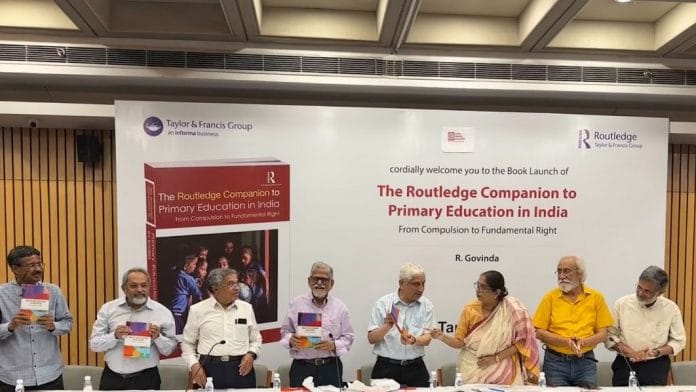New Delhi: Primary education in India has been a tale of neglect, political interference, and missed opportunities. And now, cartoons about coalition governments, the caste system, and controversial historical events like the Babri demolition are slowly disappearing from school textbooks.
“Education isn’t divorced from polity or society; if India continues this education system, its soft power will diminish,” warned Deepak Nayyar, economist and former Delhi University vice chancellor, during the launch of The Routledge Companion to Primary Education in India by Prof R Govinda, former vice chancellor of the National University of Educational Planning and Administration (NIEPA). The event, held at Delhi’s India International Centre, was more than just a book launch—it was a clarion call for reform.
The panellists included distinguished scholars, policymakers, and educators—such as historian Irfan Habib, academic and Routledge publishing director Shashank Sekhar Sinha, and educationalist NV Varghese—who peppered the serious discussion with friendly banter.
Moderated by political scientist Manoranjan Mohanty, the conversation flowed naturally, allowing for an organic and insightful exchange. The panellists explored various dimensions of the crisis in primary education, from the erosion of critical thinking in the curricula to the widening gap between policy and practice. As they spoke, many in the audience responded with questions and nods of agreement.
Govinda’s Companion to Primary Education in India traces the evolution of primary education across colonial, post-colonial, and contemporary India. The book looks beyond the surface of policy goals to explore the processes involved in implementing positive change, while also addressing the socio-political factors that have shaped education in India.
Understanding this history, emphasised the panellists, is important for future generations too. Audience member Jyoti Arora Khanna, a PhD student at JNU, agreed, saying that even though her research was related to higher education, she and her peers “must learn about the trends persisting in primary education”.
The book’s subtitle—‘From Compulsion to Fundamental Right’—references the Right to Education Act, which came into force in 2010. But, as Khanna pointed out, many challenges remain.
“India is still struggling,” she said, “There are a lot of children who are out of school, which stops us from having a larger secondary and higher education base, therefore leading to a smaller and less capable working class.”
Also Read: New book sees Delhi not through the eyes of its rulers—but 35,000 workers who come every day
‘Education system used to be better’
The event opened with Nitya Nanda, an expert in environmental economics, who set the tone by highlighting the interdisciplinary nature of the discussions ahead.
“We are here to discuss something as fundamental as education, but from diverse vantage points—political, historical, economic,” he said. Nanda’s introductory remarks underscored a central theme of the evening: the complex, interconnected issues plaguing India’s primary education system and their impact on every facet of society.
Deepak Nayyar followed with a sobering analysis of the current landscape and its shaky foundation.
“Our past shapes our future, and unfortunately, the past we’ve built in primary education is a fragile one,” he said.
A sense of urgency was palpable in the room as he spoke about the pressing need to address the systemic failures that have led to the current state of disrepair and its ripple effects.
“In the quest for development, primary education is extremely important,” he said. “It gives us a base for higher education, and that has provided a lot of economic development.”
Nayyar pointed out the irony of political players striving to boost India’s soft power on the global stage, while at the same time interfering with education and thus undermining it.
“The future of our education system has become mortgaged—it has become about what is to be read and what is not to be read,” he added.
The discussion then turned to the realities on the ground, with Shantha Sinha, a prominent child rights activist, offering a powerful account of the diminishing quality of education in India.
“It was curious for me to find out, as a specialist in this field, that India’s education used to be far better than it is today—there has been a regression” she said.
Historian S Irfan Habib provided a historical perspective, explaining how gaps between policy and implementation have consistently hindered India’s educational goals.
“Free and universal education for all children was a dream we fought for, but today it remains just that—a dream,” he lamented.
Habib also elaborated on how Govinda’s book isn’t divided chronologically into pre-colonial, colonial, and post-colonial period, but is instead organised thematically, based on when challenges arose.
“The neglect of primary education in post-colonial India is perhaps our greatest failure,” he said. “We must understand the historical mistakes to avoid repeating them.”
Also Read: Small anti-caste publisher Navayana is a stone-thrower in the big publishing world
Intact frame, broken mirror
Govinda’s book offers not just an analytical narrative but also a roadmap for the future, paying close attention to the social and political forces that have driven changes over time.
As the event drew to a close, he reflected on the themes discussed.
“The processes involved in implementing positive change are as important as the outcomes,” he said.
Deep structural issues must be tackled if meaningful reform is to be achieved, according to him.
“The education system today is like a big broken mirror—intact in its original frame, but fragmented within,” he said.
The atmosphere in the room was one of shared determination, bound by a sense of collective responsibility. In the end, the launch of The Routledge Companion to Primary Education in India was not just a celebration of a new book; it was a powerful reminder that the future of India’s education system hangs in the balance.
(Edited by Asavari Singh)






